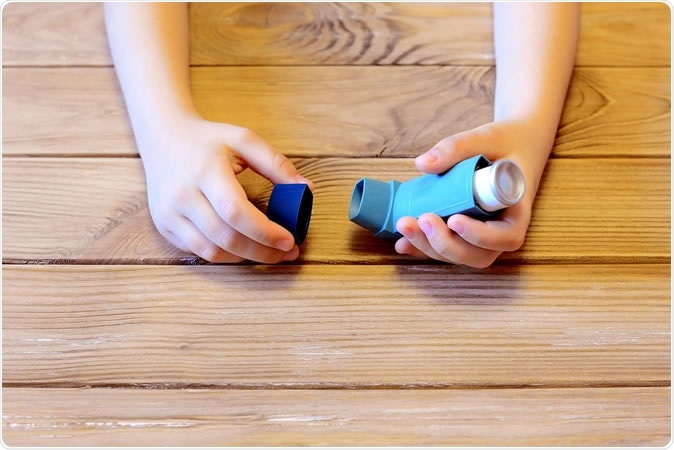Environmentalists now have a new cause to take up – the metered dose inhalers (MDIs) used by asthmatic patients to control their airway spasm.

Switching to DPIs would result in large carbon savings and can be achieved alongside reduced drug costs by using less expensive brands. Image Credit: OnlyZoia / Shutterstock
Asthma and inhalers
There are about 235 million people who have asthma the world over, says the World Health Organization (WHO), including children, among whom this is the most frequently seen chronic health condition.
Inhalers are medical devices that treat asthma by sending a modulated blast of the medication straight into the patient’s lungs to widen the airways by relieving the muscle spasm in the airway walls. This makes breathing easier as air can flow in and out of the lungs faster. About 50 million inhalers were prescribed in England in 2017, for about 5 million asthma sufferers.
There are different types of inhalers, however. Among them, MDIs contain a hydrofluoroalkane (HFA) gas to power the atomization of the solid medication, and propels it into the airways. It is estimated that 70% of the inhalers used in England, in 2017, were MDIs.
What’s wrong with MDIs?
These innocent-looking devices release HFA which accounts for almost 4% of the carbon emissions due to all the operations of the National Health Service (NHS) of the UK. This could easily be lowered by switching to alternative inhaler types, such as dry powder inhalers or aqueous mist inhalers, according to the researchers, because MDI use is associated with up to 37 times as much carbon emissions as dry powder inhalers.
What can be done?
If one in ten patients currently using MDIs were switched to the most inexpensive type of dry powder inhaler, it would mean 58,000 tons less of carbon emissions. This is how much carbon dioxide is produced by running a car from London to Edinburgh – and back – 180,000 times!
To put it another way, if one person used the more eco-friendly inhaler, it could bring down the carbon footprint just as much as if one person stopped eating meat altogether, or used insulation to optimally reduce energy costs, or recycled all possible waste materials. The total saving is estimated to be about 150-400 kg of carbon dioxide per individual per year.
The resulting mitigation of climate change would be beneficial to all people, of course – including those who already have lung disease, and will therefore be most affected by adverse changes. Researcher James Smith says, “Our study shows that switching to inhalers which are better for the environment could help individuals, and the NHS as a whole, reduce their impact on the climate significantly. This is an important step towards creating a zero carbon healthcare system fit for the 21st century.”
The NHS head, Simon Stevens, concurs: “The NHS has already cut its carbon footprint by one fifth in the past decade and giving patients the option to, where clinically appropriate, shift to lower carbon 'green' inhalers is the right thing.”
The National Institute for Health and Care Excellence (NICE) has already taken notice of this issue and has created a helpful decision aid to facilitate this decision for patients.
Warning for asthmatics
Does this mean that asthma patients should traipse to their preferred pharmacy and just trade in their MDIs for other types? Definitely not, says the study. Respiratory specialists stressed that the health of the asthma patient always comes first, and that this study should not encourage guilt or stress in these individuals. Asthma UK’s Jessica Kirby says, “We recognize the need to protect the environment, but it's critically important that people with asthma receive the medicines they need to stay well and avoid a life-threatening asthma attack.”
In fact, the researchers also caution that people with asthma should continue the medication they are on at present until their annual review. At this point, says fellow-researcher Alexander Wilkinson, “We recommend patients discuss whether a more environmentally-friendly inhaler is available and appropriate in their situation.”
The use of a different type of inhaler may be difficult or even impossible for some patients, as the efficacy of these devices depends on their proper use. Learning the right technique for a different type of inhaler requires professional guidance and support, and, in Kirby’s words, “should only be done with support from a GP or asthma nurse.”
And if a patient finds it impossible to switch, there’s no need to feel bad: says Wilkinson, there are other ways to save the planet. For one thing, good technique and regular evaluation of technique are both essential to make sure each inhaler puff works as it should, avoiding wastage. Secondly, keeping track of the doses in each inhaler will help ensure all of them are used before the inhaler is discarded. And thirdly, proper disposal is a must since they still contain HFA: they should be returned to the pharmacy once empty.
Source:
Journal reference:
Wilkinson AJK, Braggins R, Steinbach I, et alCosts of switching to low global warming potential inhalers. An economic and carbon footprint analysis of NHS prescription data in EnglandBMJ Open 2019;9:e028763. doi: 10.1136/bmjopen-2018-028763, https://bmjopen.bmj.com/content/9/10/e028763